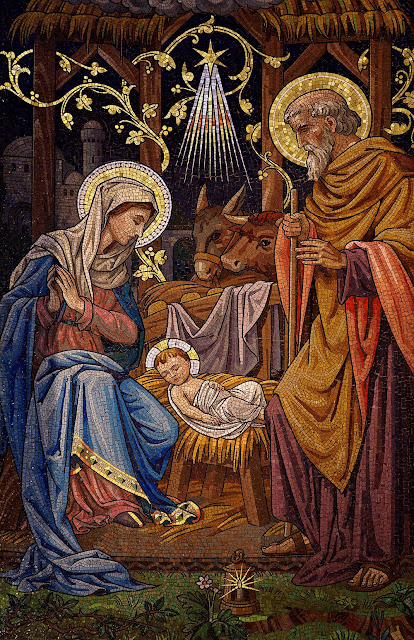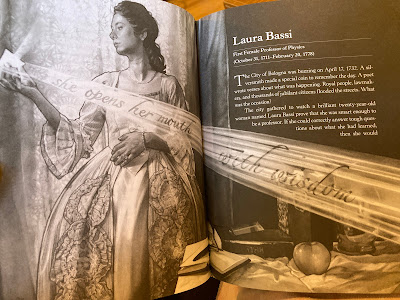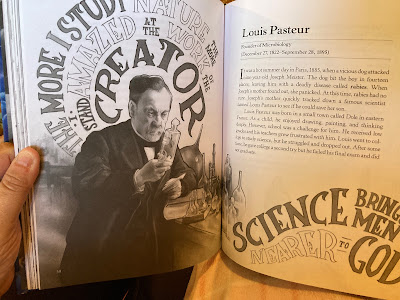Ap. Sheen gave a lecture on hagiography (lives
of the saints). In the old days, people wrote about the saints as if they were
born saints. They only wrote the good things. And now, it's often the opposite,
people only write about terrible things. Therese wrote her own--Story of a Soul. She
says, "Tell over and over again the story of God's mercies to
me." Ap. Sheen says, "if you intend to be a saint start writing
your own life now. Beware of dangers, of painting oneself holy.
"What's killing the world today is
ordinariness. Flatness. Dullness. Want of fire. We can't be happy unless we're
in love, and when we have perfect love, which is the love of God, then we are
supremely happy... Live the life you have now, but make it
holy. Start right where you are at.”
Chapter 3: Virtues of Faith, Hope &
Perseverance
How this chapter resonated with me. When we pray
for special intentions and God says No or Not Yet, we are so terribly
disappointed. But Scripture tells us to "wait on the Lord." Therese
wanted to enter Carmel at 15. There were so many obstacles. She even went to
the Holy Father. She was terribly disappointed. She offered herself to the
Child Jesus as a plaything--a ball--and she felt like he'd poked a hole and left
her in a corner. Ap. Sheen reminds us, "she did enter Carmel at 15
and today we ask for her to pray for us, not Pope Leo XIII, who had power over
her!
“This is Love's Delay. The testing. Think
of Abraham, Noah, Lazarus, the Syro-Phoenician woman who pleads with Jesus to
save her daughter. She says, "even the dogs eat crumbs from the Master's
table." So we have to be. Keep praying. Do not lose heart. All prayer is
acknowledging our dependence.”
Chapter 4: The Power of Intercession
Therese says, “I have lived for our Lord, I want
to die for Him. This is my love, and I want to be with my Beloved.” She said
she wouldn’t go to purgatory because there’s nothing there to burn off. I love
her confidence!!! “I will go straight to heaven! … I will spend my heaven doing
good on earth.”
We have two great intercessors: our pleading
Savior Jesus is the principal one and the Holy Spirit in our soul is the
second. The Little Flower says, "me too, beside Mary." Ap. Sheen
says, "we probably spend too much time praying for the dead, instead of praying
to them... I have great confidence in her. Put her to work! Don't let her
rest!"
Chapter 5: The Value of Suffering
St. Therese never looks to our Lord to be consoled. She's always looking to console
Him. Ap. Sheen says, "She is far closer to the Truth than many theologians. She writes,
"Since our Beloved has trodden the wine press alone, the wine which He
gives to drink in our turn, let us not refuse to wear garments dyed with blood.
Let us press out for Jesus a new wine which may slake His thirst."
"When Jesus says, "It is finished" He
means My mission is accomplished. I have done all the Father has asked me to
do. So if He had finished His sufferings, how could St. Therese say she has to
console him? Ap. Sheen explains, "Our Lord's sufferings were finished in
His physical Body, but His sufferings are not finished in the Mystical Body,
the Church." Recall the conversion of St. Paul. Jesus says, "I am Jesus whom you are persecuting."
St. Paul understood this mystery very well. He says in his letter to Colossians
1:24 "It is now my
happiness to suffer for you. And this is my way of helping you to complete, in
my poor human flesh, the full tale of Christ's afflictions still to be endured
for the sake of His Body, which is the Church." Therese is
thinking of His Passion still enduring in this world."
I wept reading this chapter because my heart was so much at peace that I need never worry about the people who are suffering so--Jesus is in their suffering whether they know it or not. I know He will take care of them, so I only need to ask for not mine, but Thy will be done.
Chapter
6: St. Therese and the Sword
Therese says, “O my Beloved, I understand to
what combats You have destined me. It is not on the battlefield I shall fight.
I am a prisoner of Your Love. Freely have I riveted the chain which unites me
to You and separates me forever from the world. My sword is love…”
Ap. Sheen reminds us Therese “is the patroness
of the Propagation of Faith though she was never in mission lands. The deeper
reason is that she’s a woman in love and she wanted her Beloved known all over
the world.
I came not to bring peace, but the sword. ~ Matt 10:34
“God hates peace in those who are destined for
war! And we are destined for war, spiritual war. We’ve forgotten that we are in
a combat. God stationed an angel with a flaming two-edged sword to keep our
first parents from going back to eat of the Tree of Life and thus immortalize
their evil. The only way we can ever get back into Paradise is by having that
sword run into us. It’s flaming because it’s love. It’s two-edged because it
cuts and it penetrates. It’s the sword that’s thrust inward to cut out all of
our seven pall bearers of the soul—the pride and covetousness, lust, anger,
envy, gluttony, and sloth.”
Chapter
7: On Our Relationship with God.
Ap. Sheen gives the example of pencil. “It’s
totally subservient and obedient to my will. But if the pencil had a will of
its own I couldn’t do anything with it. We do not give our human nature to God
in such a way that He can use it totally and completely. We hold back!
“Worldly people will think Therese wasted her
life in a monastery. But remember that in the divine order, some lives have to
be wasted. Mary of Bethany wastes precious perfume over our Lord’s feet. David
wasted the water brought to him at great sacrifice.
“We have to offer ourselves as pencils. Let Him
write poetry. Let Him scribble. What difference does it make? This is
happiness.”
Jesus taught: anyone who tries to save his life will lose it. But anyone who loses
his life for My sake and for the Gospel’s sake will find it. ~ Mark 8:35
Chapter
8: On Fighting Satan
We need not fear the devil if we belong to God. St.
Therese says, “I turn my back upon the adversary without ever looking him in
the face. Then I am ready to run to Jesus and tell Him I am ready to shed every
drop of blood in testimony of my belief that there is a heaven.”
Ap. Sheen shares Dr. Rollo May’s psychological
POV on the diabolical. It comes from the Greek dia ballein = tearing apart or
rending asunder. Three manifestations: nudity, violence, and distraught minds.
We see this in Matt 8:28-34 Jesus goes into the land of the Gadarenes, there’s a young man
possessed of the devil. He was naked, violent, and of a split mind. “My name is
Legion, for we are many.”
Ap. Sheen reminds us that at the end of life’s
journey “you will see either the merciful Face of Christ or the tragic face of
Satan. “Mine! Mine!” You are His. You will always be His. Fear not the battle.
Why, you’ve already won!”
Chapter
9: Suffering for the Sake of Love
I love how Ap. Sheen explains this. "A friend says,
I will pay your debt. This is a financial transference to take your burden upon
himself. You see one boy carrying another. He’s crippled. You ask, “Heavy?” But the boy answers, “No he is not heavy, he’s my brother.” This
is also transference.
"Jesus transferred to Himself 3 types of
evil—physical (sickness, disease), mental suffering, moral sufferings (guilt)... Our
Lord is the model of our spiritual life. He took upon Himself our physical
illnesses so that we would not complain but bear them patiently. He took upon
Himself all of our mental sufferings so that we would never be discouraged, for
He went into the dark for us, Himself alone. He took upon Himself our moral
guilt.
"We are guilty of the death of Christ and when
Christ is raised from the dead gloriously on Easter Sunday, we who are guilty
of His death can say, “See? See? He’s alive! I’m free!” That’s the complete
transference of guilt to Himself and the conquest of it by His Resurrection.
This is the heart and soul of Christianity.
"The Little Flower took upon herself the
physical, mental and moral ills of the world. She desired to be a victim. Therese
says, “To offer oneself as a victim to Divine Love is not to offer oneself to
sweetness and to consolation but to every bitterness, for love lives only by
sacrifice. And the more a soul wills to be surrendered to Love, the more must
she be surrendered to sacrifice.”
"As Christians, we are to continue the work of
Christ. Pray and transfer the pain of others to yourself. St. Paul says, no man
dies alone. No man lives alone. Your prayers will save souls. Remember the
paralytic. He didn’t ask for anything. But the Lord forgave his sins and healed
him. Why? Because of the prayers of the four men.
Chapter
10: St. Therese, Humility and the way of the Child
St. Therese says, “To remain little is to
recognize our nothingness.”
Phil 2:7 Let
your bearing toward one another arise out of your life in Christ Jesus. For the
Divine Nature was His from the first yet He did not think to snatch at equality
with God. But He made Himself nothing; nothing, assuming the nature of a slave.
Satan tried to make himself God.
Ap. Sheen explains, “What is the secret of
humility? To become nothing. Nothing. Never to stress our own powers, our own
wealth, our own gifts, but to recognize they all come from God. We are bidden to
become empty, to become nothing, so He can fill us, work in us. There’s the
emptiness of the Grand Canyon; it is sterile and produces nothing. Emptiness of
a flute, which if you breathe through, you can pipe a tune."
Chapter
11: St. Therese, Sin and Mercy
Ap. Sheen makes me laugh. He writes, “Today’s
world we deny human guilt and sin. It used to be that only we Catholics who
believed in the Immaculate Conception. Today most people in the world believe
they were immaculately conceived, for they deny such a thing as sin or guilt.
“Two escapes from human guilt. 1. People say
they are sick, so no penitents, only patients. 2. We rationalize our sin. We
argue. Remember Jesus and the Samaritan woman.
“We are all sinners. How are sins forgiven? Without the shedding of blood, there is no
forgiveness of sins. 2 Heb 9:22 Why? Because sin is in the blood. So blood
has to be poured out. Sin is such a serious offense that it takes the blood of
someone to block out its terrible burden.
“The Little Flower was a great theologian. She
invoked the Blood of Christ. She says, “The Precious Blood of Jesus I poured on
souls. My victory is always to run away from evil. But for the conversion of
souls, there must be the sight of the Precious Blood flowing from our Lord’s
Wounds. And this is to be the cordial bond that will heal off their sins.””
Ap. Sheen then takes us through Scripture, from
Genesis through the Gospel of John, so beautifully to show how the shedding of
blood is the foundation for the expiation of sins. The old and the new
testaments are seamless.
"This is our faith. Every time you go to
confession and a priest raises his hand in absolution over your sins, the Blood
of Christ is dripping from his fingers. When you receive Communion, you are
receiving the Body and Blood of Christ.
 "Invoke the Blood of Christ after your sin. This
is the basis of forgiveness. When we do not invoke the Blood of Christ to
have our sins forgiven, we begin to shed one another’s blood.
"Invoke the Blood of Christ after your sin. This
is the basis of forgiveness. When we do not invoke the Blood of Christ to
have our sins forgiven, we begin to shed one another’s blood.
Let no one ever despair of Mercy. The Blood of
Christ has paid all debts if you but invoke it."
 I learned about this beautiful Cross of Snow in Colorado and the poem that Longfellow wrote upon the death of his wife through a homily by Fr. Joseph Mary on the Feast of the Exaltation of the Holy Cross. I especially loved the quote from Fulton Sheen about the Cross without Jesus making it a burden, whereas, with our Savior, it becomes redemptive.
I learned about this beautiful Cross of Snow in Colorado and the poem that Longfellow wrote upon the death of his wife through a homily by Fr. Joseph Mary on the Feast of the Exaltation of the Holy Cross. I especially loved the quote from Fulton Sheen about the Cross without Jesus making it a burden, whereas, with our Savior, it becomes redemptive. 
































